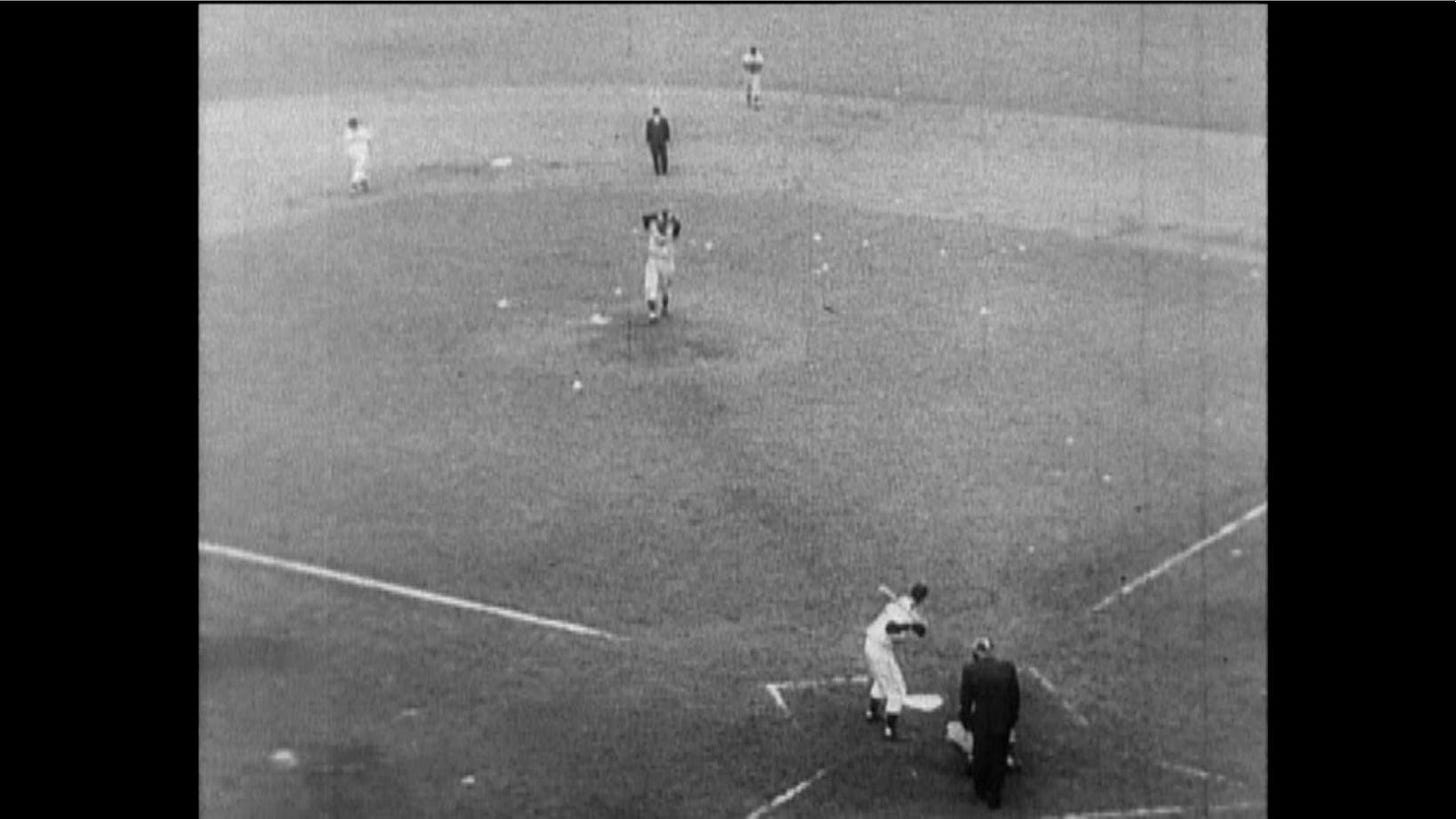Branca's Pitch: Ralph Branca Looks Back
Branca's Pitch goes beyond The Shot Heard Round the World as retired Dodgers pitcher Ralph Branca works on writing his memoir.
While perusing through the baseball documentaries available through the library, the film on Branca piqued my interest. I mean, here's the guy who gave up one of the most legendary home runs in baseball history on October 3, 1951. They even gave it a name! All it took was a single pitch in the third game between the Brooklyn Dodgers and New York Giants. Bobby Thomson may have achieved all of the fame but Branca had the unfortunate luck of throwing the pitch. It could have been Don Newcombe as he pitched up until being relieved in the ninth inning by Branca. Lo and behold, Thompson hits the home run and broadcaster Russ Hodges' call lives on to this day. Branca, blamed as a scapegoat, was just never able to recover.
"One little mistake and it costs you," remarks Branca.
Weirdly enough, the pitch was up and in. In short, it's not an easy pitch to hit a home run. In fact, it's the most difficult. And yet, Thomson hit in the clutch and became a legend.
The Thomson home run at New York's Polo Grounds also transcended baseball. It became one of those things where people could tell you exactly where they were. Much like Pearl Harbor, the Kennedy assassination, September 11, and October 7. What I didn't realize until recently is that the Dodgers and Giants played in a best-of-three series. In this era, most teams tying for a spot in the postseason end up playing in a tiebreaker game. The 1950s were certainly different. The two clubs would travel back and forth between Ebbets Field and the Polo Grounds. Still though, more iconic moments have joined it through the years. Buckner's legs. Kirk Gibson. Kirby Puckett. Joe Carter. David Freese. Moments that baseball fans can probably tell you exactly where they were.
What we learn about Branca is that he went into life insurance after retiring from baseball. His brother had been the one to suggest writing a book because of how many stories he had to tell. Meanwhile, Branca mentions how it was his sister writing to teams about Branca being a pitcher. The irony of signing with the Brooklyn Dodgers? Much like Vin Scully, Branca grew up a Giants fan.
But anyway, the only reason why we know Branca's name is because of the game. Obviously, he is a member of the 1940s and early 1950s Dodgers and pitched for two teams that lost the World Series. Unfortunately, Branca didn't see any action during the 1956 Fall Classic--all three against the New York Yankees. Again, he was on the way out by this point in his career. He's not a Hall of Fame player like some of his other teammates. The question going into the film and his book is if he could ever forgive the New York Giants for winning the game. As Branca tells it though, the home run should never have happened. For more on this, you have to go back to a 2001 article in the Wall Street Journal by Joshua H. Prager. There were allegations of Thomson stealing signs. Did he though?
Anyway, what Prager's article did was trigger a reassessment about Branca, especially depending on one's allegiances. But regardless, he cannot tell you how to feel but merely what happened.
A few years before Branca opens up to tell his side of the story, Prager wrote The Echoing Green: The Untold Story of Bobby Thomson, Ralph Branca and the Shot Heard Round the World. Where Prager's book expands on his previous article, Branca teams up with David Ritz to pen a memoir. The memoir could very well be the pitcher's final chance at restoring a legacy. What happens as Branca writes his book with Ritz is that the two form a friendship, however unlikely. Perhaps what is the toughest about writing the book is time plus distance. Essentially, Branca is sticking to the essence even if memories of events might end up being off. G-d only know just how resourceful sites like Baseball Reference can be with game details.
"Branca has an amazing and gifted memory but there are things that he misremembered," Prager said.
For instance, Branca had not been forced to change his jersey number. Regardless, Ritz--as a co-author--has no interest in being objective.
There's a lot of pain inside of Branca and that's where Ritz comes in. Consider the fact that the New York Giants--according to Branca--cheated. This isn't exactly new information because again, it's covered in Prager's book and the earlier article. Not that I've read his book yet but there's bound to be press coverage about it. That's how baseball scandals are. Anyway, both Branca and Thomson respected each other by the end of their lives. Branca even wore Giants colors to Thomson's funeral. But could he ever forgive him? Watch the film or read the book to find out.
Branca's Pitch not only takes audiences behind the scenes of the writing process but explores mythology, truth, and memory.
DIRECTOR: Andrew J. Muscato
FEATURING: Ralph Branca, David Ritz, Joshua Prager





